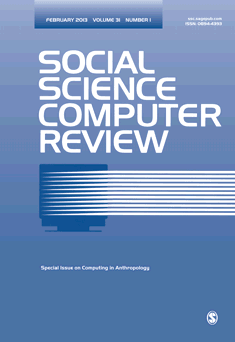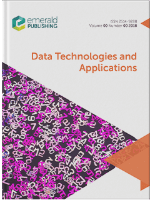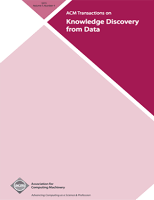
Social Network Analysis and Mining
Scope & Guideline
Exploring the Depths of Digital Interactions
Introduction
Aims and Scopes
- Social Network Analysis (SNA):
The journal extensively covers methodologies and models for analyzing social networks, including the study of node relationships, community detection, and influence propagation within networks. - Data Mining Techniques:
Methods of data mining are applied to extract meaningful patterns and insights from social media data, including sentiment analysis, rumor detection, and engagement prediction. - Machine Learning Applications:
Research often integrates machine learning techniques to enhance the accuracy of predictions and classifications within social networks, focusing on areas such as sentiment analysis, hate speech detection, and influence maximization. - Behavioral Studies:
The journal explores user behavior in various contexts, including emotional dynamics, mental health, and responses to misinformation, highlighting the social implications of network interactions. - Interdisciplinary Approaches:
The journal encourages interdisciplinary research that combines insights from computer science, social sciences, and public health, facilitating a comprehensive understanding of social phenomena.
Trending and Emerging
- Misinformation and Fake News Detection:
With the rise of misinformation on social media platforms, there is a significant increase in research dedicated to detecting and mitigating fake news, employing advanced machine learning and natural language processing techniques. - Health-Related Social Media Analysis:
Recent publications focus on analyzing health-related discussions, particularly concerning mental health and public health crises like COVID-19, utilizing social media data to understand public sentiment and behavioral patterns. - Multimodal Data Integration:
There is a growing trend towards integrating various data types (text, images, videos) for comprehensive analysis in social networks, enhancing the understanding of user interactions and content dissemination. - Dynamic and Temporal Network Analysis:
Research is increasingly focusing on dynamic and temporal aspects of networks, studying how relationships and influences evolve over time, which is critical for modeling real-world social interactions. - Ethical and Social Implications of Social Networks:
Emerging studies address the ethical implications of social network analysis, exploring issues like privacy, data security, and the societal impact of technology on user behavior.
Declining or Waning
- Traditional Graph Theory:
Although foundational, traditional graph-theoretical approaches are increasingly being overshadowed by more complex models that integrate dynamic, multilayer, or temporal networks, reflecting a shift towards capturing the intricacies of real-world interactions. - Simple Sentiment Analysis:
Basic sentiment analysis techniques are becoming less prevalent as researchers move towards more sophisticated models, such as those incorporating deep learning or multimodal data, which yield richer insights into social sentiments. - Static Network Analysis:
Research focusing solely on static network structures is declining as the field shifts towards dynamic network analysis that considers the evolution of connections and interactions over time. - Generalized Social Media Studies:
Broad studies on social media usage without specific focus are less common, as there is a growing trend towards targeted investigations that explore particular issues such as misinformation, hate speech, or user engagement in specific contexts.
Similar Journals

SOCIAL SCIENCE COMPUTER REVIEW
Navigating the digital landscape of social science inquiry.SOCIAL SCIENCE COMPUTER REVIEW, published by SAGE Publications Inc, is a premier peer-reviewed journal that has been contributing to the intersection of technology and social science since its inception in 1983. With an impressive H-index and categorized in Q1 across multiple disciplines including Computer Science Applications, Law, Library and Information Sciences, and Social Sciences (miscellaneous), this journal stands out as a critical resource for researchers, professionals, and students seeking to explore the implications of computational methods in societal contexts. The journal is widely recognized for its rigorous scholarship, evidenced by its high Scopus ranks in various categories, notably ranking #17 in Social Sciences - Law (98th percentile) and #9 in General Social Sciences (96th percentile), making it an essential publication for those looking to stay at the forefront of social science research. Though it does not provide open access, the journal's commitment to disseminating cutting-edge research ensures its vital role in advancing knowledge and fostering interdisciplinary collaboration. For those engaged in studying and applying computational techniques within the social sciences, SOCIAL SCIENCE COMPUTER REVIEW is a valuable and indispensable source.

Internet Technology Letters
Advancing the Frontiers of Internet Technology.Internet Technology Letters, published by John Wiley & Sons Ltd, is a dynamic and rapidly evolving journal that focuses on the innovative applications and developments within the realms of Artificial Intelligence, Computer Networks and Communications, Information Systems, and Software. With its E-ISSN 2476-1508 and a defined convergence period from 2018 to 2024, this journal seeks to address emerging trends and critical challenges confronting the digital landscape today. Recognized in the Q3 quartile range across multiple computer science categories in 2023, it serves as a valuable resource for researchers, professionals, and students seeking to advance their knowledge and stay updated on significant technological advancements. While currently not an open-access journal, Internet Technology Letters holds a prominent position on platforms like Scopus, ranked within the middle percentiles, reflecting its contribution to the academic community. The journal aims to foster connectivity between academia and industry, encouraging submissions that promote interdisciplinary collaboration and innovation. By creating a platform for sharing groundbreaking research, Internet Technology Letters plays a crucial role in shaping future technological landscapes.

KNOWLEDGE AND INFORMATION SYSTEMS
Bridging Theory and Practice in Information SystemsKNOWLEDGE AND INFORMATION SYSTEMS, published by SPRINGER LONDON LTD, is a distinguished journal in the field of information systems, artificial intelligence, and human-computer interaction. With its ISSN 0219-1377 and E-ISSN 0219-3116, this journal has built a robust reputation since its inception, featuring a convergence of valuable research from 2005 through 2024. Catering to a diverse academic audience, it is classified among the leading journals in its category, proudly holding a Q1 ranking in Information Systems and Q2 rankings in multiple other domains. The journal aims to publish cutting-edge research that not only advances theoretical understanding but also provides practical applications within these rapidly evolving fields. Although it is not an Open Access journal, subscribers can access a wealth of knowledge critical for researchers, practitioners, and students looking to enhance their expertise. With a 2023 Scopus rank placing it within the 66th percentile for Information Systems, KNOWLEDGE AND INFORMATION SYSTEMS is an invaluable resource for those committed to pushing the frontiers of knowledge in technology and information science.

Data Technologies and Applications
Bridging Disciplines with Data-Driven SolutionsData Technologies and Applications is a leading academic journal published by Emerald Group Publishing Ltd, captivating the interest of researchers, professionals, and students alike within the dynamic fields of Information Systems and Library and Information Sciences. With its ISSN 2514-9288 and E-ISSN 2514-9318, this journal holds a commendable Q2 ranking in Library and Information Sciences and a Q3 ranking in Information Systems as of 2023, reflecting its impact and contribution to ongoing discourse in these disciplines. Operating with an open access model, it provides a platform for accessing high-quality research that encompasses innovative methodologies and applications of data technologies. The journal's scope includes interdisciplinary studies that leverage data to enhance decision-making, improve information retrieval, and foster technological convergence. Housed in the United Kingdom, the journal facilitated its first publication in 2018, with a commitment to fostering valuable academic conversations through to 2024 and beyond. Engage with insightful research that shapes the future of data technologies and applications, making this journal an essential resource for anyone invested in the advancement of knowledge in these pivotal fields.

Acta Universitatis Sapientiae Informatica
Empowering Research Through Open AccessActa Universitatis Sapientiae Informatica, published by SCIENDO, is an esteemed open-access journal in the field of computer science and informatics. Since its transition to open access in 2013, the journal has fostered an inclusive academic environment that allows researchers, professionals, and students to freely access cutting-edge research and innovations. With its ISSN 1844-6086 and E-ISSN 2066-7760, Acta Universitatis Sapientiae Informatica aims to disseminate high-quality scholarly articles that cover a broad scope of topics ranging from theoretical foundations to practical applications in informatics. Located in Warsaw, Poland, the journal serves as an essential platform for advancing the discourse in computer science, thus playing a critical role in both regional and international research communities.

ACM Transactions on Knowledge Discovery from Data
Catalyzing Progress in Knowledge Discovery from DataACM Transactions on Knowledge Discovery from Data (TKDD), published by the Association for Computing Machinery, is a prestigious journal at the forefront of the interdisciplinary realm of data mining and knowledge discovery. With an impressive Q1 ranking in Computer Science and a Scopus rank of #43 out of 232, this journal stands out as a top-tier resource for innovative research that addresses complex challenges in data science. Covering impactful studies from 2007 to 2024, TKDD presents cutting-edge algorithms, methodologies, and applications that shape the future of knowledge extraction from vast datasets. While not an open-access journal, it provides a platform for researchers, professionals, and students to disseminate their findings and engage with the latest advancements in this rapidly evolving field. By fostering collaboration and knowledge sharing, TKDD plays a vital role in advancing the understanding and application of data analysis techniques, making it an essential read for anyone involved in the pursuit of knowledge from data.

Big Data Mining and Analytics
Shaping Tomorrow's Technologies with Big Data InsightsBig Data Mining and Analytics, published by TSINGHUA UNIVERSITY PRESS, stands at the forefront of interdisciplinary research in the fields of Artificial Intelligence, Computer Networks and Communications, Computer Science Applications, and Information Systems. With an impressive Q1 ranking in multiple categories as of 2023, this journal serves as a critical platform for researchers and professionals eager to explore innovative techniques and methodologies related to big data analytics. Since its transition to Open Access in 2018, Big Data Mining and Analytics has aimed to increase the visibility and accessibility of its cutting-edge research, making permanent strides in the global academic landscape. Housed in Beijing, China, and actively embracing the converged years from 2018 to 2024, the journal aims to cultivate a rich discourse on emerging trends and applications, ensuring its relevance in a rapidly evolving technological environment. Join a vibrant community of scholars dedicated to advancing the frontiers of knowledge in big data.

Data Science and Engineering
Empowering innovation through data-driven research.Data Science and Engineering is a premier open access journal published by SPRINGERNATURE, dedicated to advancing the fields of data science, artificial intelligence, computational mechanics, and information systems. Since its inception in 2016, this journal has rapidly established itself as a leader in the academic community, boasting an impressive Q1 ranking in multiple computer science categories, including Artificial Intelligence, Software, and Information Systems. With a commitment to disseminating high-quality research, it caters to a diverse audience of researchers, professionals, and students eager to explore the intersection of data and technology. The journal's robust global reach, combined with its respected reputation, empowers authors to share their findings widely, facilitating breakthroughs and innovations across the digital landscape. Join the vibrant community of scholars contributing to this integral field of study, and stay informed with the latest research by accessing the journal freely online.

Intelligent Data Analysis
Unlocking Insights Through Intelligent Data ExplorationIntelligent Data Analysis is a highly regarded journal published by IOS Press, specializing in the fields of Artificial Intelligence, Computer Vision, and Pattern Recognition. With its ISSN 1088-467X and E-ISSN 1571-4128, the journal has been a cornerstone of scholarly communication since its inception in 1997, serving as a vital resource for researchers, professionals, and students engaged in advancing methodologies and applications in intelligent data analysis. The journal maintains its significance with impressive Scopus ranks, indicating its notable position within the academic community. Although currently not an Open Access journal, Intelligent Data Analysis offers a wealth of insights and findings, encouraging collaboration and knowledge exchange among its readership. With an impact factor reflective of its rigorous selection processes, the journal traverses a broad range of topics, contributing to ongoing discussions and innovations in its field. As the journal looks toward shaping future research until 2024 and beyond, it remains a pivotal platform for disseminating cutting-edge research and fostering academic inquiry.

International Journal of Advanced Computer Science and Applications
Unlocking New Horizons in Computer Science Applications.International Journal of Advanced Computer Science and Applications, published by SCIENCE & INFORMATION SAI ORGANIZATION LTD, stands as a significant platform in the ever-evolving field of computer science. With its ISSN 2158-107X and E-ISSN 2156-5570, the journal aims to disseminate high-quality research and innovations from diverse areas within computer science, embracing cutting-edge technologies and methodologies. As of 2023, it holds a commendable Q3 ranking in the field, placing it among a competitive cohort of journals while showcasing its commitment to scholarly excellence. The journal operates under an open access model, ensuring that its content is widely accessible to researchers, professionals, and students alike, thereby fostering a collaborative environment for knowledge-sharing and advancing the discipline. With a history of converged contributions from 2017 to 2024, the International Journal of Advanced Computer Science and Applications serves as a vital resource for those seeking to stay at the forefront of computer science research and applications.